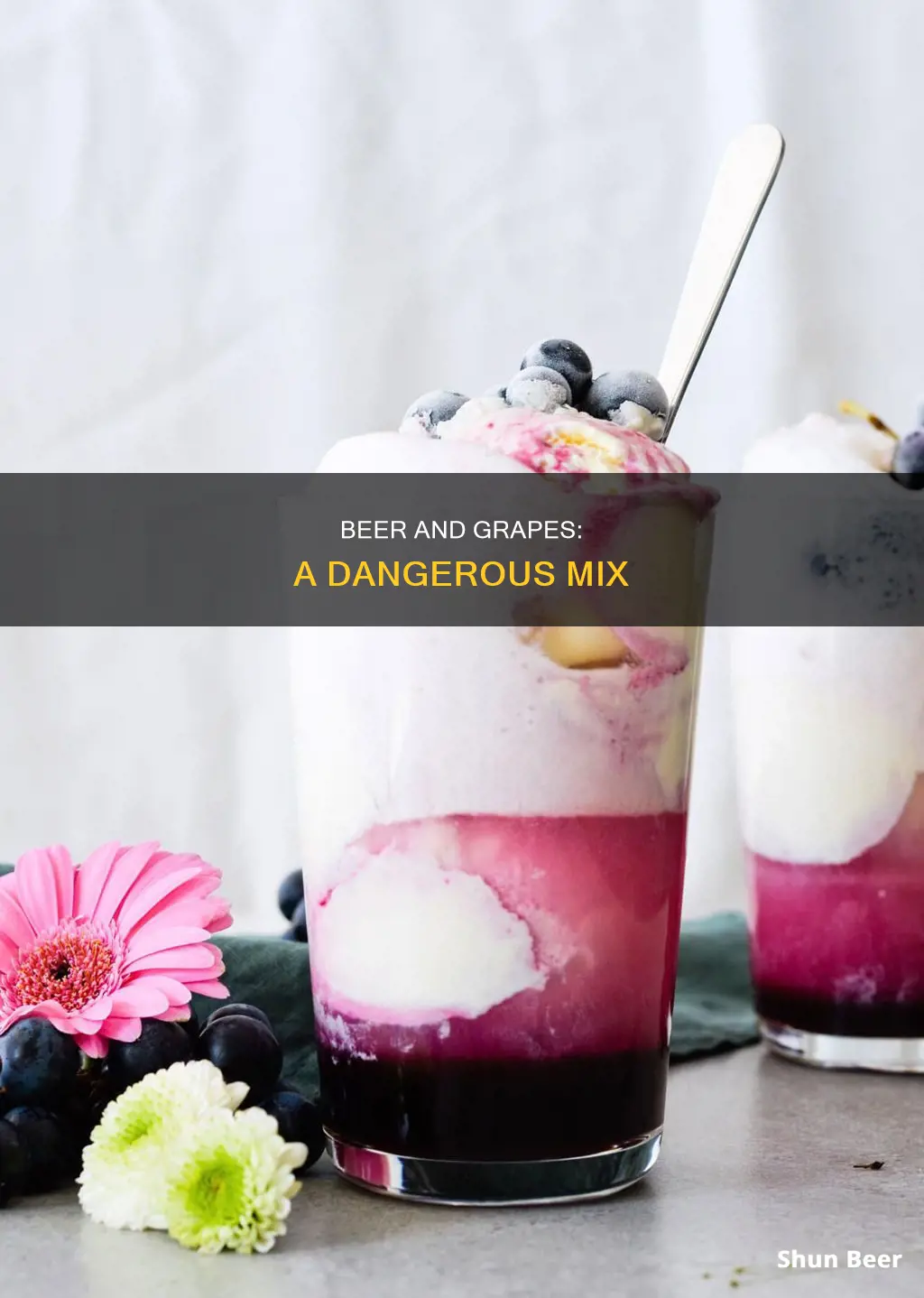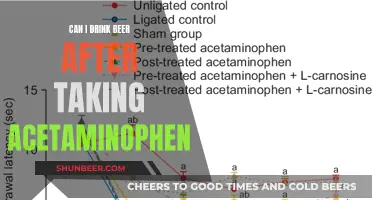
There is an old saying that goes, Beer before wine and you'll feel fine; wine before beer and you'll feel queer. This is a warning against mixing beer and wine, which contain grain and grapes, respectively. However, a study by Jöran Köchling et al. in 2019 found that neither the type nor order of alcoholic beverages affected hangover intensity. The strongest predictors for hangover intensity were perceived drunkenness and vomiting.
What You'll Learn
- Mixing beer and wine is safe, but drinking too much may cause sickness and a hangover
- Drinking beer and wine in any order will not make you feel drunker
- Drinking carbonated beverages may increase the rate at which you absorb alcohol
- Beer and wine have compounds that may worsen hangovers and people have different sensitivities
- Drinking different drinks at a bar does not give you a hangover

Mixing beer and wine is safe, but drinking too much may cause sickness and a hangover
Mixing beer and wine is safe, but drinking too much alcohol may cause sickness and a hangover. While some people believe that mixing beer and wine can lead to worse hangovers, there is no scientific evidence to support this claim. The likelihood of experiencing sickness or a hangover is more closely related to the total amount of alcohol consumed.
A study published in the American Journal of Clinical Nutrition found that neither the type nor the order of alcoholic beverages had a significant effect on hangover severity. This means that drinking beer before wine or wine before beer did not impact the severity of hangover symptoms. The study also found that the best predictors of a bad hangover were how drunk the participants felt and whether they vomited after drinking.
It is important to note that mixing drinks can make it harder to keep track of alcohol consumption, which can lead to negative consequences. Excessive drinking, even in one night, can result in empty calories, dehydration, poor decision-making, and a weakened immune system. Therefore, it is crucial to drink responsibly and in moderation.
To minimize the side effects of drinking alcohol, it is recommended to drink water between alcoholic beverages to support hydration and slow down alcohol consumption. Eating a meal before drinking can also help reduce the effects of alcohol by physically obstructing the alcohol from coming into contact with the stomach lining and slowing down its absorption.
While mixing beer and wine may not directly cause sickness or a hangover, it is important to be mindful of the total amount of alcohol consumed and to drink responsibly to avoid negative consequences.
Is Beck's Non-Alcoholic Beer Safe for Recovering Alcoholics?
You may want to see also

Drinking beer and wine in any order will not make you feel drunker
There is a common belief that drinking beer and wine together will make you feel drunker. However, this is just a myth, and there is little scientific evidence to support this claim. The idea that mixing beer and wine will make you drunker is similar to the saying, "liquor before beer, you're in the clear; beer before liquor, never been sicker." This saying suggests that the order in which you drink alcohol matters and can influence how drunk or sick you feel.
A study conducted by Jöran Köchling and others in 2019 set out to investigate the influence of the combination and order of beer and wine consumption on hangover intensity. The study found that neither the type nor the order of consumed alcoholic beverages significantly affected hangover intensity. This means that drinking beer and wine in any order will not make you feel drunker. The strongest predictors for hangover intensity were perceived drunkenness and vomiting.
Another factor that may contribute to how drunk you feel is the setting or context in which you are drinking. For example, a British study found that participants in the youngest age group reported that drinking any alcoholic beverage in a social setting was likely to boost their energy levels and confidence and make them feel more attractive. Expectations also play a role, as if you expect a particular drink to make you feel a certain way, it probably will because you are expecting it to.
The main ingredient in alcoholic beverages that causes drunkenness is ethanol, also known as alcohol, ethyl alcohol, or grain alcohol. The symptoms of intoxication you experience and their intensity depend on various factors, such as the drink's alcohol concentration, how fast you drink, how much you consume, your sex, body size, and tolerance. However, the type of alcohol you consume is not one of the factors that affect how drunk you feel.
While drinking beer and wine in any order will not make you feel drunker, it is important to remember that drinking too much alcohol can lead to dangerous levels of intoxication and severe hangovers. It is always essential to drink responsibly and in moderation.
Truvada and Beer: Is It Safe to Drink Alcohol?
You may want to see also

Drinking carbonated beverages may increase the rate at which you absorb alcohol
The idea that you shouldn't drink beer and grapes (or grain and grape) is a common saying with little scientific backing. While it is true that drinking carbonated beverages may increase the rate at which you absorb alcohol, this is only slightly and there is little evidence to support it. A study by Roberts and Robinson in 2007 found that 14 out of 21 subjects absorbed alcohol with a carbonated mixer at a faster rate, but 7 subjects showed either no change or a decrease in rate. The mean absorption rate for the carbonated mixer was 4.39 ± 0.45 (mg/100 ml/min), and the difference between this absorption rate and that with a still mixer (1.08 + 0.36) was significant (p = 0.006). This suggests that carbonation may indeed increase the rate of alcohol absorption, but the effect is not consistent across all individuals.
Carbonated alcoholic drinks increase the rate of alcohol absorption due to the pressure inside the stomach and small intestine, which forces the alcohol to be absorbed more quickly into the bloodstream. This is similar to the effect of sugars and juices mixed with alcohol, which also speed up the absorption rate. However, it is important to note that the concentration of alcohol also affects its absorption rate. Low alcohol concentrations (2.75%) are absorbed at a lower rate than higher concentrations (20%), suggesting a linear relationship between the two variables. Additionally, alcohol absorption is thought to be maximal at concentrations of 10-20%.
The rate of alcohol absorption varies considerably among individuals and is influenced by a variety of factors, including gender, mood, food intake, amount and speed of consumption, tolerance, physical condition, medication, and altitude. For example, food slows down the rate of intoxication because it causes the pyloric valve at the bottom of the stomach to close while digestion takes place, keeping alcohol from entering the small intestine where most of it is absorbed. Greasy, high-protein, and fatty foods are particularly effective in slowing down intoxication because they are more difficult to digest and stay in the stomach longer.
While carbonation may increase the rate of alcohol absorption, it is important to note that it is not the only factor influencing intoxication and that the effect may vary across individuals. Additionally, the concentration of alcohol and the presence of food or mixers can also impact the rate of absorption.
Beer and Migraines: What's the Connection?
You may want to see also

Beer and wine have compounds that may worsen hangovers and people have different sensitivities
It is a well-known saying that you should not mix drinks that contain grain (beer, whiskey) and grapes (wine) or any drink that contains fruit (like cider). However, this is just a silly superstition. Drinking different drinks at a bar does not give you a hangover. It is the amount of alcohol you consume that causes a hangover.
That being said, both beer and wine do contain compounds that may worsen hangovers, and people have different sensitivities to these compounds. Congeners are compounds produced during fermentation that contribute to the taste and smell of alcoholic drinks. Darker spirits, such as bourbon, tend to have higher levels of congeners than clear spirits, and these can worsen hangover symptoms for some people. Sulfites, which are added to wine as preservatives, are another possible offender. People with an allergy or sensitivity to sulfites are more likely to get headaches from drinking wine. If you have asthma, you may be more sensitive to sulfites.
In addition to congeners and sulfites, histamines, which are natural byproducts of the brewing and fermentation process, can also cause allergic-like reactions in some people. These reactions can include flushing (redness of the face, neck, and upper chest), itchy or painful hives, a runny nose, coughing, sneezing, difficulty breathing, nausea, vomiting, and/or diarrhea.
To avoid a hangover, the best strategy is to drink in moderation or to choose not to drink at all. However, if you do find yourself with a hangover, there are some time-tested strategies to help you feel better. Getting some sleep is the best way to deal with a hangover, as it gives your body time to recover. Drinking water or other non-alcoholic beverages can also help to combat dehydration and related symptoms. Eating bland foods like toast, crackers, and broth can help stabilize your blood sugar and replenish lost electrolytes. Finally, taking an over-the-counter pain reliever can help with headaches and body aches, but it is important to proceed with caution as the combination of alcohol and certain pain relievers can be toxic to the liver and irritate the stomach.
The President's Beer: Is it Legal?
You may want to see also

Drinking different drinks at a bar does not give you a hangover
The myth that mixing drinks causes worse hangovers is just that—a myth. The reality is that drinking a lot of alcohol, whether it's beer, wine, liquor, or a combination, will lead to a hangover. The only way to completely avoid a hangover is to not drink alcohol or to drink in moderation.
While the type of drink may not directly cause a hangover, different drinks do contain varying levels of congeners, which are compounds produced during fermentation that contribute to the taste and smell of alcoholic beverages. Darker spirits, such as bourbon, tend to have higher levels of congeners than clear spirits, and these can worsen hangover symptoms for some people. Additionally, people with a sensitivity to sulfites, which are preservatives added to wine, may experience headaches after drinking wine.
It's important to note that drinking carbonated beverages may slightly increase the rate at which alcohol is absorbed, but the difference is minimal and has not been conclusively proven. So, whether you're drinking beer, wine, liquor, or a mix of them, it's the total amount of alcohol consumed that will determine the severity of a hangover.
To reduce the intensity of a hangover, it is recommended to pay attention to the quantity and quality of alcohol consumed. Drinking smaller, non-intoxicating amounts or consuming alcoholic beverages with fewer congeners, such as vodka or gin, may lower the likelihood of experiencing a hangover. Additionally, drinking non-alcoholic beverages during and after alcohol consumption can help reduce dehydration.
Ashland, Alabama: Beer Drinking Laws and Regulations
You may want to see also
Frequently asked questions
Mixing beer and wine won't make you more drunk, but it may make your hangover worse. Beer and wine have different compounds that can cause a hangover, so by mixing the two, you may be exposing yourself to different hangover-causing agents.
"Liquor before beer, you're in the clear; beer before liquor, never been sicker" is a common saying about the order in which drinks are consumed.
"Beer before wine and you'll feel fine; wine before beer and you'll feel queer" is another saying that has been dispelled by modern studies.
The best way to avoid a hangover is to drink in moderation, as drinking a lot of alcohol is what leads to hangovers.







